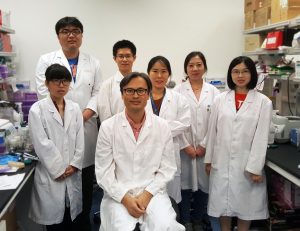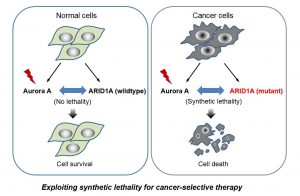A research team led by Prof Joong Sup Shim, from the Faculty of Health Sciences (FHS), University of Macau (UM), have achieved a significant breakthrough in cancer research with their discovery of a new target for treating colorectal cancer by applying the genetic theory of ‘synthetic lethality’. The related paper, titled ‘Targeting AURKA-CDC25C Axis to Induce Synthetic Lethality in ARID1A-deficient Colorectal Cancer Cells’, has been published in Nature Communications.
Cancer-driving mutations can be roughly divided into two main categories: tumour oncogene mutations, and tumour suppressor mutations. The current targeted cancer therapies focus primarily on inhibiting tumour oncogene, as it is the simple and straightforward way to inhibit cancer growth. However, it has been a major clinical challenge to deal with tumour suppressor mutations as they cannot be targeted by drugs. It is therefore of utmost importance to identify druggable targets for tumour suppressor mutations. Synthetic lethality is a genetic interaction between two (or more) genes where a single gene deficiency is tolerable for cell viability, whereas deficiencies in both genes lead to cell death. This old genetic concept has been the most successful approach to targeting cancers with tumour suppressor mutations. The authors of this study include Wu Changjie, Junfang Lyu, Eun Ju Yang, Liu Yifan, and Zhang Baoyuan, three of whom are PhD students, with the other being a research assistant, in the Faculty of Health Sciences.
ARID1A is a component that is frequently mutated in a variety of cancers including colorectal cancer. Prof Shim’s research team used a high-throughput screening approach to identify synthetic lethal partners of an emerging tumour suppressor gene, ARID1A, in genetically-engineered colorectal cancer cell lines. The team recently identified a tumour protein, aurora kinase A, as a synthetic lethality partner of ARID1A, and deduced the mechanism of their interactions. They further showed that the pharmacological inhibitors of aurora kinase A have a strong anti-cancer activity in a variety of colorectal cancer cells that carry ARID1A mutations in vitro and in vivo. This study demonstrated for the first time that ARID1A has a synthetic lethality interaction with aurora kinase A and that pharmacological targeting of aurora kinase A represents a novel strategy for treating colorectal cancer cells carrying ARID1A mutations. Furthermore, this study has opened up a new avenue for the targeted therapy for a variety of cancers with mutations in ARID1A or SWI/SNF complex. The research project received most of the funding from UM’s Multi-year Research Grant, with partial support from the Science and Technology Development Fund of the Macao SAR.
Source: Faculty of Health Sciences
Media Contact Information:Communications Office, University of Macau
Albee Lei Tel:(853) 88228004Kelvin U Tel:(853) 88224322Email:prs.media@um.edu.moUM Website:www.umac.mo


